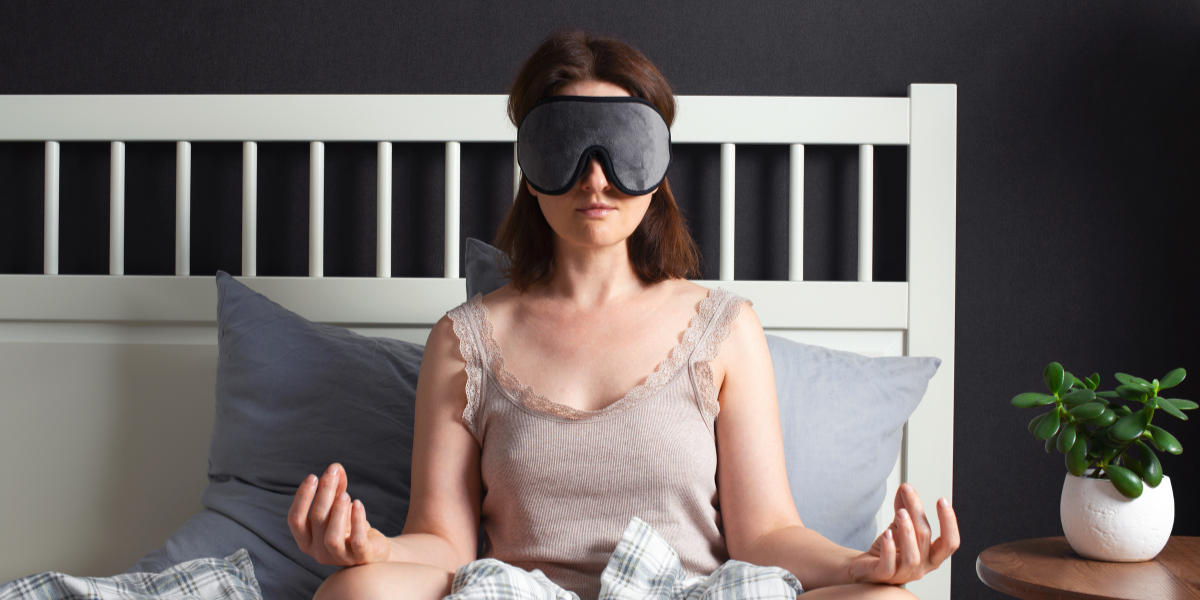Key Takeaways:
- Understanding Melatonin’s Role: Melatonin helps regulate sleep cycles, making it easier to fall asleep and wake up at regular times.
- Importance of a Bedtime Routine: A consistent wind-down routine promotes natural melatonin production, enhancing sleep quality.
- Avoiding Common Pitfalls: Avoiding bright screens and heavy meals before bed can prevent sleep disruptions and boost melatonin levels naturally.
Ever find yourself tossing and turning, wishing for a deeper, more restful sleep? Quality sleep is essential for overall well-being, yet modern-day stress and screen time often disrupt our natural sleep rhythms. At Reposé, we understand the importance of gentle, effective solutions to combat sleepless nights. Our melatonin gummies offer a natural, non-habit-forming option crafted with high-quality ingredients to support a smooth transition into restful sleep.
In this article, we’ll explore how winding down and supporting melatonin production can lead to better, more restorative sleep.
Why Winding Down Before Bed Matters
A well-thought-out bedtime routine is more than a simple ritual; it’s a foundational part of achieving restful, uninterrupted sleep. Winding down before bed allows the mind and body to transition smoothly from the busyness of the day to a state of calm, encouraging better sleep quality and overall well-being. This intentional process not only promotes relaxation but also optimizes our natural sleep-wake cycle, supporting the body’s ability to rejuvenate overnight. Here’s a closer look at why winding down matters, along with effective strategies to enhance your nightly routine.
Signals The Brain To Relax
When you create a consistent wind-down routine, it serves as a clear signal to your brain that it’s time to unwind. This process gradually shifts the brain from a state of high alert to one of calm, allowing for a smoother transition to sleep. Without this signal, the brain may remain in “daytime mode,” making it harder to relax fully.
Lowers Stress Hormone Levels
A proper wind-down routine can help reduce cortisol, the primary stress hormone that keeps us alert and prepared for challenges. Elevated cortisol levels in the evening can interfere with the body’s ability to relax, which affects sleep quality. By engaging in calming activities, we can naturally reduce cortisol, making it easier for the body to slip into a restful state.
Supports Melatonin Production
Melatonin, the hormone responsible for sleep regulation, is naturally produced in response to darkness. However, without a calming period before bed, melatonin production can be delayed, disrupting the sleep-wake cycle. Establishing a wind-down routine in a dim environment can help the body produce melatonin earlier, supporting a more natural sleep onset.
Reduces Mental Clutter
Our minds are often filled with thoughts from the day’s events, future tasks, or unresolved worries, all of which can be disruptive when trying to fall asleep. Taking time to relax and clear mental clutter helps reduce the cognitive load, allowing the mind to settle into a more peaceful state. This reduction in mental noise is key to achieving deeper, more restorative sleep.
Enhances Sleep Quality
Consistently winding down before bed doesn’t just make it easier to fall asleep; it also contributes to the quality of sleep throughout the night. A relaxed mind and body are less likely to wake up during the night, allowing for a more continuous and restorative sleep cycle. This deeper sleep leaves us feeling more refreshed and ready for the day ahead.
Enhance your nightly wind-down routine with Repose Melatonin Gummies—your natural aid for better sleep. Crafted to support healthy melatonin levels, these gummies can help you ease into relaxation and wake up feeling refreshed. Ready to improve your sleep quality?
Understanding Melatonin: The Body’s Sleep Hormone
Melatonin plays a pivotal role in our sleep-wake cycle, acting as the body’s natural signal for bedtime. Produced by the pineal gland in response to darkness, this hormone doesn’t directly induce sleep but rather prepares the mind and body for rest, promoting a sense of calm that eases the transition to sleep. Here’s a closer look at melatonin’s functions and why understanding this “sleep hormone” can enhance our approach to achieving quality rest.
Regulates The Sleep-Wake Cycle
Melatonin is crucial for synchronizing our internal clock with the natural day-night rhythm, helping us feel alert in the morning and sleepy at night. As evening approaches and light exposure decreases, melatonin levels gradually rise, preparing the body for sleep. This cycle helps establish a natural sleep-wake rhythm, making it easier to maintain consistent rest patterns.
Responds To Darkness
Melatonin production is triggered by darkness, a response that evolved to help our bodies prepare for nighttime rest. When the environment becomes dark, the pineal gland releases melatonin, signaling that it’s time to wind down. Excessive exposure to artificial light in the evening can disrupt this process, delaying melatonin release and interfering with sleep onset.
Promotes Calm And Relaxation
While melatonin doesn’t directly induce sleep, it fosters a sense of tranquility and relaxation that primes the body for rest. By lowering alertness levels and preparing the body for a restful state, melatonin helps create an optimal environment for sleep. This calming effect highlights the importance of relaxing activities before bed to naturally support melatonin’s effects.
Impacted By Lifestyle Factors
Various lifestyle factors, such as late-night screen use, irregular sleep schedules, and high stress, can inhibit melatonin production. Blue light from screens, for instance, mimics daylight and can disrupt the brain’s natural signals to produce melatonin. Being mindful of these influences can support healthier melatonin levels, ultimately aiding in better sleep quality.
Essential For Sleep Quality
Melatonin not only aids in falling asleep but also contributes to the depth and quality of sleep by maintaining a stable sleep-wake cycle. When melatonin levels rise and fall in alignment with natural light patterns, it supports uninterrupted, rejuvenating sleep. This regular cycle leaves us feeling more refreshed and balanced, underscoring melatonin’s essential role in our overall health.
How Melatonin Supports Your Sleep Cycle
Melatonin is essential for aligning our body’s internal clock, promoting a natural cycle of sleep and wakefulness. This hormone adjusts our alertness levels to match the rhythms of day and night, preparing the body for rest as the evening sets in. By understanding melatonin’s role in our sleep cycle, we can take steps to support this natural process and achieve more restorative sleep.
Synchronizes With The Circadian Rhythm
Melatonin works in harmony with our circadian rhythm, which follows a 24-hour cycle influenced by light and darkness. As night falls, melatonin levels begin to rise, helping us feel sleepy and signaling to the brain that it’s time to rest. This synchronization is crucial for maintaining a balanced sleep-wake cycle that aligns with our daily schedules.
Prepares The Body For Rest
The increase in melatonin as evening approaches helps prepare the body for a restful night by reducing alertness and slowing down physical processes. This shift creates an environment conducive to relaxation, where heart rate, breathing, and energy levels decrease. These physiological adjustments foster a smooth transition into sleep, making it easier to drift off peacefully.
Counteracts Evening Stimulation
Our modern lifestyle, filled with artificial light and screens, can interfere with melatonin’s natural production. Blue light from screens, in particular, mimics daylight, signaling to the brain that it’s still daytime and suppressing melatonin release. By managing screen time and limiting bright light exposure in the evening, we can support melatonin’s role in promoting a natural sleep cycle.
Supports Consistent Sleep Patterns
Maintaining healthy melatonin levels contributes to a stable sleep pattern, making it easier to fall asleep and wake up at regular times. When melatonin production is aligned with natural light cycles, it reinforces a dependable rhythm that improves sleep quality. Consistency in sleep and wake times enhances both mental alertness and physical well-being.
Improves Overall Sleep Quality
Balanced melatonin levels not only aid in falling asleep but also influence the depth and continuity of sleep throughout the night. When melatonin rises naturally in the evening and declines in the morning, it supports uninterrupted, restorative sleep. This optimal cycle leaves us feeling refreshed, emphasizing the importance of melatonin in enhancing our overall sleep experience.
Effective Wind-Down Routines To Boost Melatonin Production
Establishing a calming wind-down routine before bed can greatly support melatonin production, promoting better sleep. Here are some effective practices to incorporate into your nightly routine:
- Dim the Lights: Reducing exposure to bright lights, especially blue light from screens, encourages natural melatonin production. Consider dimming your lights an hour before bed and using “night mode” settings on electronic devices if you must use them.
- Limit Screen Time: Phones, tablets, and computers emit blue light, which can suppress melatonin. Try to avoid screens at least 30 minutes to an hour before sleep. Instead, engage in screen-free activities like reading a book or listening to calming music.
- Practice Relaxation Techniques: Activities such as deep breathing exercises, gentle stretching, or meditation can help calm the mind and body, reducing stress levels and encouraging melatonin release.
- Create a Consistent Bedtime Ritual: Going through the same steps each night, like having a warm cup of herbal tea, journaling, or enjoying a warm shower, signals to your brain that it’s time for sleep.
- Set a Regular Bedtime: Going to bed at the same time each night helps reinforce your natural circadian rhythm, supporting consistent melatonin production.
These practices collectively create an environment that promotes relaxation and primes the body for sleep, making it easier for melatonin levels to rise naturally.
Common Mistakes To Avoid When Winding Down
Creating a relaxing wind-down routine is key for quality sleep, but some habits can unknowingly interfere with this process, disrupting melatonin production and delaying rest. By identifying and avoiding these common mistakes, you can help support your body’s natural sleep cycle and prepare for a more restorative night.
Using Bright Screens Right Before Bed
Exposure to screens like TVs, phones, and computers before bed introduces blue light, which can suppress melatonin production and delay the onset of sleep. This artificial light signals the brain to stay alert, counteracting the natural process of winding down. Opting for screen-free activities an hour before bed can support melatonin release and create a calming pre-sleep environment.
Engaging In Stimulating Activities
Intense conversations, work emails, or mentally taxing tasks can increase alertness and make it challenging to relax before bed. When the mind is engaged in high-stimulation activities, it becomes harder to shift into a restful state. Calming activities like reading, meditation, or gentle stretching are better alternatives for easing the mind into relaxation mode.
Inconsistent Bedtimes
Irregular bedtimes can disrupt the body’s internal clock, making it difficult to establish a steady sleep routine. When sleep and wake times vary widely, the brain’s ability to maintain a reliable circadian rhythm is impacted. Committing to a consistent bedtime helps reinforce a natural sleep-wake cycle, promoting more restful and predictable sleep.
Eating Heavy Meals Or Exercising Late At Night
Eating large meals or doing intense exercise close to bedtime can raise metabolism and increase body temperature, both of which can interfere with sleep. Digestion and high energy levels are counterproductive to winding down and preparing for rest. Choosing lighter snacks and saving vigorous exercise for earlier in the day can support a smoother transition to sleep.
Neglecting A Calming Environment
Overlooking the sleep environment itself—such as room temperature, lighting, and noise levels—can also disrupt a wind-down routine. A bedroom that’s too bright, noisy, or warm can inhibit melatonin production and hinder relaxation. Ensuring a dark, quiet, and cool environment helps the body naturally prepare for rest, enhancing the effectiveness of your wind-down routine.
Final Thoughts
Establishing a consistent, calming wind-down routine is key to supporting melatonin production and achieving quality sleep. By understanding melatonin’s role in the sleep cycle and adopting practices that promote its natural production, we can help our bodies transition smoothly from the busyness of the day into restful slumber. Simple changes like reducing screen time, practicing relaxation techniques, and maintaining a regular bedtime can make a significant difference.
Prioritizing these habits not only helps improve sleep but also enhances overall well-being, as a good night’s rest is fundamental to physical and mental health. Embrace a nightly routine that promotes relaxation, and let melatonin do its work to guide you toward more restful, rejuvenating sleep.
Read also:
- What Is Facial Toner and How Can It Transform Your Skin?
- The Best Facial Toner for Men’s Daily Routine
- Say Goodbye to Chapped Lips: The Essential Lip Scrub for Healing and Softness
Frequently Asked Questions About Winding Down Before Bed
What is the best time to start winding down before bed?
It’s best to start winding down at least 30 to 60 minutes before bed. This gives your body time to relax and naturally prepare for sleep, allowing melatonin levels to rise.
Can melatonin be taken every night?
While melatonin is generally safe for short-term use, it’s a good idea to consult a healthcare professional if you’re considering nightly use to address chronic sleep issues.
How does light exposure affect melatonin production?
Exposure to artificial light, especially blue light from screens, can suppress melatonin production, making it harder to fall asleep. Reducing screen time and dimming lights can help.
Do melatonin gummies have any side effects?
Melatonin gummies are typically well-tolerated, but some people may experience drowsiness, headaches, or digestive issues. Start with a low dose and adjust as needed.
Is melatonin safe for teenagers and children?
While melatonin can be helpful for some children and teens, especially those with sleep disorders, it’s important to consult a pediatrician before use to ensure appropriate dosage.
How does stress impact melatonin production and sleep?
High stress levels increase cortisol, which can disrupt melatonin production and delay sleep onset. Techniques like deep breathing and mindfulness can help manage stress before bed.
Can I increase melatonin levels through diet?
Yes, foods like tart cherries, bananas, and nuts naturally contain melatonin or support its production. Including these in your diet may help regulate your sleep cycle.
How long does melatonin stay in your system?
Melatonin typically stays in the body for around 4-5 hours, though this can vary based on factors like metabolism, age, and dosage.
What’s the ideal room environment to support melatonin and better sleep?
A cool, dark, and quiet room is ideal for sleep. Blackout curtains and a room temperature between 60-67°F help create an optimal environment for melatonin production and quality rest.
Are there natural alternatives to melatonin supplements?
Yes, natural alternatives include herbal teas (like chamomile or valerian root), relaxation exercises, and consistent bedtime routines, all of which support healthy melatonin levels and sleep.
Sources:
- What We Did in Bed. (2019). Google Books. https://books.google.com/books?hl=en&lr=&id=MBWsDwAAQBAJ&oi=fnd&pg=PP1&dq=how+to+wind+down+before+bed&ots=CIRsgpeAUo&sig=35uSt3pHfVNC-puSw6sOHB538KA
- Vincent, G. E., Sargent, C., Roach, G. D., Miller, D. J., Kovac, K., Scanlan, A. T., Waggoner, L. B., & Lastella, M. (2019). Exercise before bed does not impact sleep inertia in young healthy males. Journal of Sleep Research, 29(3). https://doi.org/10.1111/jsr.12903
- Sleeping Through the Night, Revised Edition. (2024). Google Books. https://books.google.com/books?hl=en&lr=&id=nT3-pLLu97MC&oi=fnd&pg=PR7&dq=how+to+wind+down+before+bed&ots=eKmi5eQKq_&sig=3b3NmCGpmKAIE38Cqjken0R0mhE










